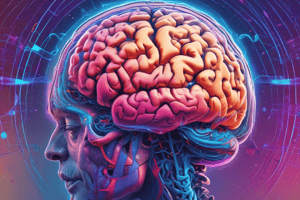Podcast
Questions and Answers
Which level of consciousness involves individuals experiencing brief episodes of sleep while still being aware of their surroundings?
Which level of consciousness involves individuals experiencing brief episodes of sleep while still being aware of their surroundings?
- Light sleep
- Dozing (correct)
- Awake and alert
- Drowsy
In which level of consciousness do individuals start to lose touch with reality?
In which level of consciousness do individuals start to lose touch with reality?
- Awake and alert
- Light sleep (correct)
- Drowsy
- Dozing
Which stage of consciousness involves individuals who are fully aware of their environment, thoughts, and emotions?
Which stage of consciousness involves individuals who are fully aware of their environment, thoughts, and emotions?
- Light sleep
- Drowsy
- Awake and alert (correct)
- Dozing
People in the dozing level of consciousness may experience which characteristic?
People in the dozing level of consciousness may experience which characteristic?
During light sleep, individuals may have difficulty in:
During light sleep, individuals may have difficulty in:
What is the primary function of deep sleep?
What is the primary function of deep sleep?
Which of the following is NOT a potential consequence of obstructive sleep apnea (OSA)?
Which of the following is NOT a potential consequence of obstructive sleep apnea (OSA)?
During which stage of sleep do individuals typically experience decreased muscle activity?
During which stage of sleep do individuals typically experience decreased muscle activity?
Which of the following is NOT a function of sleep?
Which of the following is NOT a function of sleep?
What is a common symptom of obstructive sleep apnea?
What is a common symptom of obstructive sleep apnea?
Study Notes
Consciousness: Understanding the Levels, Sleep, and Sleep Apnea
Consciousness is a complex cognitive process characterized by an individual's awareness and perception of their surroundings, thoughts, feelings, and sensations. It involves various aspects such as attention, memory, feeling, thinking, and perception, which are all interconnected and influence each other. In this article, we will explore the different levels of consciousness, the importance of sleep, and the impact of sleep apnea on these processes.
Levels of Consciousness
Human consciousness can be divided into several stages based on its depth and responsiveness. These stages range from full wakefulness to deep unconscious states. Some common levels of consciousness include:
-
Awake and alert: This is the state where individuals are fully aware of their environment, their thoughts, and their emotions. They have complete control over their actions and behavior.
-
Drowsy: People in this stage are still conscious, but they find it challenging to stay awake. Their reactions may be slower, and their ability to concentrate is reduced.
-
Dozing: Individuals in this level of consciousness experience brief episodes of sleep while still maintaining some awareness of their surroundings. These periods usually last only seconds to minutes.
-
Light sleep: During light sleep, people start to lose touch with reality. They might respond to sounds, but they would typically change position without moving much because muscle activity decreases.
-
Deep sleep: At this level, individuals enter a period of restful sleep without dreaming. It is difficult to awaken them until the end of the cycle when people naturally go through REM sleep.
The specific events and experiences during the different levels of consciousness depend on the type and duration of each stage.
Sleep: Its Importance and Functions
Sleep serves numerous essential functions in our lives, including physical restoration, temperature regulation, immune system enhancement, and emotional well-being. It plays a crucial role in consolidating memories, processing information, and enhancing problem-solving skills. Additionally, sleep helps maintain healthy metabolic and cardiovascular systems, supports growth and development in children and adolescents, and improves mood and cognition.
Sleep Apnea: Impact on Consciousness and Quality of Life
Obstructive sleep apnea (OSA) is a condition where breathing repeatedly stops and starts during sleep due to a blockage in the airway. Patients suffering from OSA often experience disrupted sleep patterns, leading to daytime drowsiness, poor concentration, and impaired memory. Chronic sleep deprivation affects the brain's ability to function correctly and can contribute to mental health issues like depression and anxiety. Furthermore, sleep apnea has been linked to heart disease, stroke, hypertension, and diabetes, highlighting its detrimental effects on overall health.
Understanding the relationship between consciousness, sleep, and sleep disorders is vital for promoting better health outcomes and quality of life. As research continues, we hope to uncover more about how these factors interact and how we can best support those who struggle with sleep disturbances and changes in their level of consciousness.
Studying That Suits You
Use AI to generate personalized quizzes and flashcards to suit your learning preferences.
Description
Explore the different levels of human consciousness, the importance of sleep for physical and mental well-being, and the impact of sleep apnea on cognitive processes and overall health. Learn about awake/alert, drowsy, light sleep, deep sleep stages, sleep functions, and the consequences of obstructive sleep apnea.




